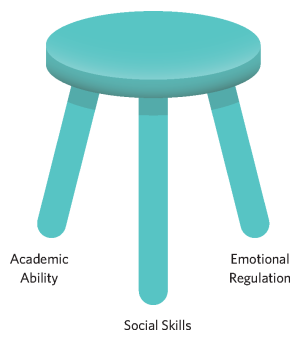College Planning for Students with ADHD
Judith Bass
Download PDF
 Zach, a junior in high school, is beginning to think about college and all the fun he’s going to have once he gets there—the football games, the frat parties, finally being on his own. Zach’s parents, however, cannot picture Zach living outside their home. He still can’t get out of bed for school. He only does homework when his academic coach is with him and even then, he forgets to hand it in the next day.
Zach, a junior in high school, is beginning to think about college and all the fun he’s going to have once he gets there—the football games, the frat parties, finally being on his own. Zach’s parents, however, cannot picture Zach living outside their home. He still can’t get out of bed for school. He only does homework when his academic coach is with him and even then, he forgets to hand it in the next day.
 Melina, a high school senior with ADHD, had been a straight A student all four years, taking many honors and AP classes. However, she had a lot of help earning those grades. She had academic tutors for English, math, and science, an executive function coach to help her stay organized and manage her workload, and two parents who checked all of her work before she turned anything in. Her parents were so proud of her grades, and when she was accepted to her state’s flagship university, they were ecstatic. All of their hard work had paid off.
Melina, a high school senior with ADHD, had been a straight A student all four years, taking many honors and AP classes. However, she had a lot of help earning those grades. She had academic tutors for English, math, and science, an executive function coach to help her stay organized and manage her workload, and two parents who checked all of her work before she turned anything in. Her parents were so proud of her grades, and when she was accepted to her state’s flagship university, they were ecstatic. All of their hard work had paid off.
As a parent of a high school student who has ADHD, you are likely excited about the idea of your child attending college, but perhaps terrified at the prospect of finding a college where your child can thrive. As we learn more and more about the ADHD brain, it is evident that the transition from high school to college for students with ADHD must be carefully thought out and planned. One important consideration in college planning is whether your child is even ready to start college right after high school. Assessing your child’s college readiness will guide you in finding the best path forward.
When thinking about college readiness, most people focus on academic readiness, due to the societal belief that good grades alone lead to acceptance into a good college. Many parents of children with ADHD are worried about their child being accepted to any college at all, because their grades are not a true reflection of their strengths and abilities. But college readiness is more than having good grades; it includes social and emotional readiness as well.
Children with ADHD typically lag three to five years behind their peers in social/emotional development, even if they are years ahead of those same peers academically. This uneven development can lead to your child having difficulty connecting with other students, and she may need additional time to “catch up” socially. In college, students will have to self-advocate with professors, accept help and support when they need it, and not try to “do it all on their own.” Good grades might get a student accepted to a college, but self-advocacy, self-awareness, and strong executive function skills are what students need to stay in college and graduate.
Looking back at Zach and Melina, they might seem like very different students, but they have one characteristic in common: their dependence on others to provide structure. Zach’s parents are realistic about Zach’s inability to function independently, while Melina’s mom and dad are unaware of all the scaffolding that has been wrapped around their daughter.
Melina’s parents overlooked something very important in preparing her for college. Melina had been provided with so much scaffolding and external structure that she had never developed the skills needed to stay organized, to use her time efficiently and effectively, or to manage her workload. When she started her first year of college and that scaffolding was taken away, she quickly became overwhelmed by the volume of work. Without an internal sense of organization or time management, Melina began to fall behind in her classes, and by mid-semester, she stopped going to classes altogether.
Zach’s parents are considering a gap year program for him after high school. They recognize that his vision of college is not one that will lead to a successful outcome, and they are hoping that an extra year will allow him to mature and gain some perspective about the purpose of college.
Essential life and executive function skills
There are certain essential skills that a student must have before leaving home for college. The most difficult for students with ADHD to master, but perhaps the most crucial, are life skills and executive function skills.
When evaluating a child’s independent living skills, think about your child’s ability to wake himself up on a school morning and be ready to leave on time. Does she take her medication independently? Does she know the names, dosages, and purpose of her medications? Your child should be able to cook a simple meal and do his own laundry. He should also be able to manage money wisely and not spend impulsively.
Think about your child’s executive function skills. Is your child able to manage time efficiently, especially unstructured time? Can he begin homework independently? Can she break down assignments into manageable pieces? Does your child frequently lose belongings?

All three are equally important in
assessing college readiness.
Selecting a college
When searching for colleges for a student with ADHD, it is important to find the right learning environment. Look for an atmosphere that is accepting of all learning styles, that has professors who teach in a variety of ways. Find out if there is an ADHD coaching program with professional coaches. Some colleges have certified ADHD coaches on staff. Find out if there are professional learning specialists who can work with a student one-on-one on a regular basis. Seek out colleges with experiential (hands-on) learning, project-based learning, and flexibility in showing mastery of a subject.
Look for colleges that provide some structure, but do not have too many core requirements. Students with ADHD can do well in classes they enjoy, but find it difficult to do the work for classes that do not pique their interest and are not engaging. Look for colleges that are interactive and discussion-based. Students with ADHD do best when they are held accountable, and having a good relationship with their professors is a key factor.
In a smaller discussion-based class, students with ADHD have more opportunities to display their strengths. Large lecture classes are passive learning environments that require a student to sit still and listen to a professor talk. Often the teacher does not even know the student’s name, and with no feeling of connection, the temptation to skip class is a lot greater. Students with social anxiety will feel more comfortable in smaller colleges with small class sizes, where it will be easier for them to interact with peers and participate in class discussions.
The college visit is also a crucial factor in choosing a college. For students with ADHD, experiencing a college campus in person has much more impact than reading about it. A college visit should include a campus tour and an information session, if offered. Your child should make a list of what he likes and doesn’t like about each college.
You should also visit the Office of Accessibility Services (be aware that schools may have different names for this office) and talk to the director or a staff member. Does this person seem genuinely caring? Look around to see if it is an inviting environment. Make sure there is a designated distraction-reduced setting for exams. If your child does not feel comfortable with the people there or if the building is on the outskirts of campus, your child is not likely to go there for help.
Brain maturation, gap years, and transition programs
I met Harry when he was 25 and ready to try college for the second time. Harry was a twice-exceptional student: intellectually gifted with extremely poor executive function skills. He had attended college right after high school, planning to major in engineering. He barely managed to make it through two semesters when he was placed on academic probation and decided to drop out. After working for a few years, Harry regained his confidence in his abilities and was willing to give college another try. This time, however, he knew what he needed to do to be successful and was willing to seek out the help he needed to succeed.
For students with ADHD, who traditionally are most at risk for dropping out, waiting even two or three years to begin college can make a world of difference. The ADHD brain takes longer to mature, especially when it comes to impulsivity, and waiting for that maturity can give the young adult with ADHD a more purposeful and meaningful college experience.
If you are concerned about your child’s ability to manage life as a college student, completing work on time, accepting help from a coach or tutor, or being socially comfortable with peers, you should strongly consider a gap year. Your child will benefit from time away from home to develop independence and greater self-confidence.
It is not uncommon today for students to take a gap year or to enroll in a transition program before starting college. Fortunately, there are many alternative options to give your child the time to develop better executive function skills, independent living skills, and social/emotional maturity.
Often when students have too much support throughout high school, they get the message that they cannot accomplish anything on their own. A gap year gives students an opportunity to make decisions and deal with the consequences of their actions. They can learn from their mistakes in a safe setting. They learn to speak up and advocate for themselves.
A college transition program can help students develop the executive functioning and life skills they need to succeed in college and in life. They develop better time management and organization skills, and most importantly, they recognize and accept that they are responsible for their own success.
The gap year does not have to include an academic component; in fact, for students with ADHD, exploring the world around them is a great way to learn. They learn much better experientially than by reading textbooks or listening to lectures. A gap year should provide structure, promote emotional growth, and assist students in developing a sense of personal responsibility. In addition, programs for students with weak executive functioning skills should focus on students’ strengths and include experiences that boost self-confidence and self-worth.
Students with ADHD often have an insatiable curiosity about many topics and seek out answers in unconventional ways. In my experience, students with ADHD learn more outside the classroom than inside. Their path will likely be different than the one you imagined, but if it allows the student to grow, mature, and thrive, their college experience will yield a much better outcome.
One of the dangers for students with ADHD is hitting a speed bump in the road and not knowing how to get back on track. The longer they stay on the side of the road, the further behind they fall, which causes them to become overwhelmed and shut down.
 Judith S. Bass, CEP, is an internationally recognized expert in the field of college and postsecondary placement for students who learn differently. For the past twenty-plus years, she has provided comprehensive college planning services for students with all types of learning challenges, including those with ADHD and autism. Bass is a contributing author to the book, Navigating the Transition from High School to College for Students with Disabilities. Her articles have appeared in numerous magazines, including Washington Parent and CHADD’s Attention magazine. She developed a free resource, CollegeWebLD (www.collegewebld.com), which is a one-stop source of information on college disability services at over 400 colleges in the United States. She is past chair of the Commission on Credentialing for AICEP (www.aicep.org) and a past board member of the Independent Educational Consultants Association (IECA). She also serves as a consultant to several independent high schools in the Washington, DC, area. She received her undergraduate degree in education and Spanish from Stony Brook University, earned a graduate level certificate in college counseling from UCLA, and holds the Certified Educational Planner designation. Learn more at www.basseducationalservices.com.
Judith S. Bass, CEP, is an internationally recognized expert in the field of college and postsecondary placement for students who learn differently. For the past twenty-plus years, she has provided comprehensive college planning services for students with all types of learning challenges, including those with ADHD and autism. Bass is a contributing author to the book, Navigating the Transition from High School to College for Students with Disabilities. Her articles have appeared in numerous magazines, including Washington Parent and CHADD’s Attention magazine. She developed a free resource, CollegeWebLD (www.collegewebld.com), which is a one-stop source of information on college disability services at over 400 colleges in the United States. She is past chair of the Commission on Credentialing for AICEP (www.aicep.org) and a past board member of the Independent Educational Consultants Association (IECA). She also serves as a consultant to several independent high schools in the Washington, DC, area. She received her undergraduate degree in education and Spanish from Stony Brook University, earned a graduate level certificate in college counseling from UCLA, and holds the Certified Educational Planner designation. Learn more at www.basseducationalservices.com.
Other Articles in this Edition
When Your Teen Lacks Self-Confidence
Remote Learning for Children with ADHD
Ace the Break: Avoid the “Summer Slide”
Stimming and Fidgeting to Calm and Focus
College Planning for Students with ADHD
Will ADHD Symptoms Improve with Marijuana Use?
Interoceptive Awareness and ADHD
Your Keys to a Happier ADHD Relationship
